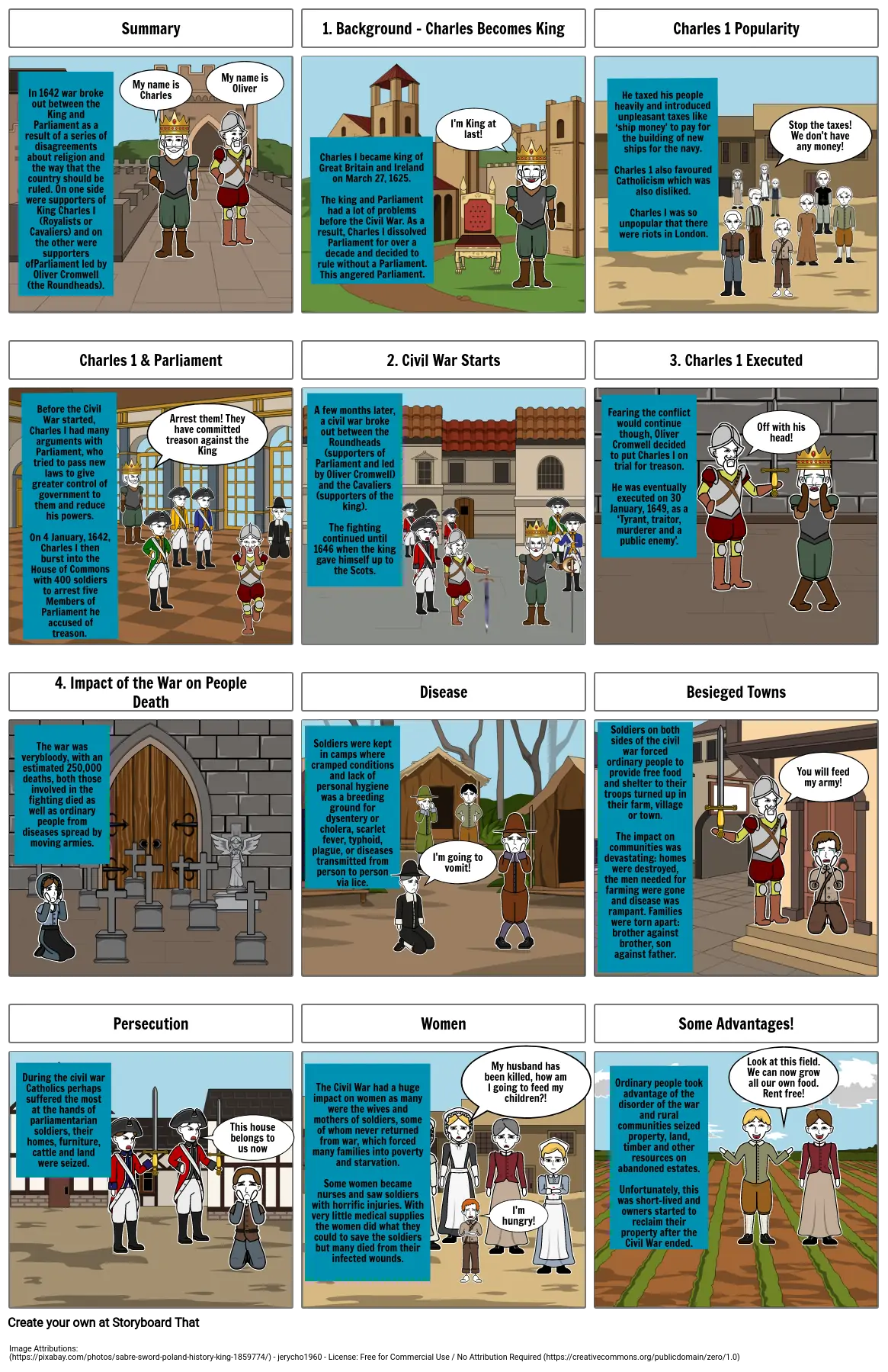The English Civil War 1642 - 1651 by Charlotte Fisher

Storyboard Text
- Summary
- In 1642 war broke out between the King and Parliament as a result of a series of disagreements about religion and the way that the country should be ruled. On one side were supporters of King Charles I (Royalists or Cavaliers) and on the other were supporters ofParliament led by Oliver Cromwell (the Roundheads).
- My name is Charles
- My name is Oliver
- 1. Background - Charles Becomes King
- Charles I became king of Great Britain and Ireland on March 27, 1625. The king and Parliament had a lot of problems before the Civil War. As a result, Charles I dissolved Parliament for over a decade and decided to rule without a Parliament. This angered Parliament.
- I'm King at last!
- Charles 1 Popularity
- He taxed his people heavily and introduced unpleasant taxes like ‘ship money’ to pay for the building of new ships for the navy.Charles 1 also favoured Catholicism which was also disliked.Charles I was so unpopular that there were riots in London.
- Stop the taxes! We don't have any money!
- Charles 1 & Parliament
- Before the Civil War started, Charles I had many arguments with Parliament, who tried to pass new laws to give greater control of government to them and reduce his powers.On 4 January, 1642, Charles I then burst into the House of Commons with 400 soldiers to arrest five Members of Parliament he accused of treason.
- Arrest them! They have committed treason against the King
- 2. Civil War Starts
- A few months later, a civil war broke out between the Roundheads (supporters of Parliament and led by Oliver Cromwell) and the Cavaliers (supporters of the king).The fighting continued until 1646 when the king gave himself up to the Scots.
- 3. Charles 1 Executed
- Fearing the conflict would continue though, Oliver Cromwell decided to put Charles I on trial for treason.He was eventually executed on 30 January, 1649, as a ‘Tyrant, traitor, murderer and a public enemy’.
- Off with his head!
- 4. Impact of the War on PeopleDeath
- The war was verybloody, with an estimated 250,000 deaths, both those involved in the fighting died as well as ordinary people from diseases spread by moving armies.
- Disease
- Soldiers were kept in camps where cramped conditions and lack of personal hygiene was a breeding ground for dysentery or cholera, scarlet fever, typhoid, plague, or diseases transmitted from person to person via lice.
- Besieged Towns
- Soldiers on both sides of the civil war forced ordinary people to provide free food and shelter to their troops turned up in their farm, village or town. The impact on communities was devastating: homes were destroyed, the men needed for farming were gone and disease was rampant. Families were torn apart: brother against brother, son against father.
- You will feed my army!
- Persecution
- Women
- I'm going to vomit!
- My husband has been killed, how am I going to feed my children?!
- Some Advantages!
- Look at this field. We can now grow all our own food. Rent free!
- During the civil war Catholics perhaps suffered the most at the hands of parliamentarian soldiers, their homes, furniture, cattle and land were seized.
- This house belongs to us now
- The Civil War had a huge impact on women as many were the wives and mothers of soldiers, some of whom never returned from war, which forced many families into poverty and starvation. Some women became nurses and saw soldiers with horrific injuries. With very little medical supplies the women did what they could to save the soldiers but many died from their infected wounds.
- I'm hungry!
- Ordinary people took advantage of the disorder of the war and rural communities seized property, land, timber and other resources on abandoned estates. Unfortunately, this was short-lived and owners started to reclaim their property after the Civil War ended.
- Image Attributions: (https://pixabay.com/photos/sabre-sword-poland-history-king-1859774/) - jerycho1960 - License: Free for Commercial Use / No Attribution Required (https://creativecommons.org/publicdomain/zero/1.0)
Image Attributions
- https://pixabay.com/photos/sabre-sword-poland-history-king-1859774/ - jerycho1960 - (License Free for Commercial Use / No Attribution Required (https://creativecommons.org/publicdomain/zero/1.0) )
Over 30 Million Storyboards Created
No Downloads, No Credit Card, and No Login Needed to Try!
